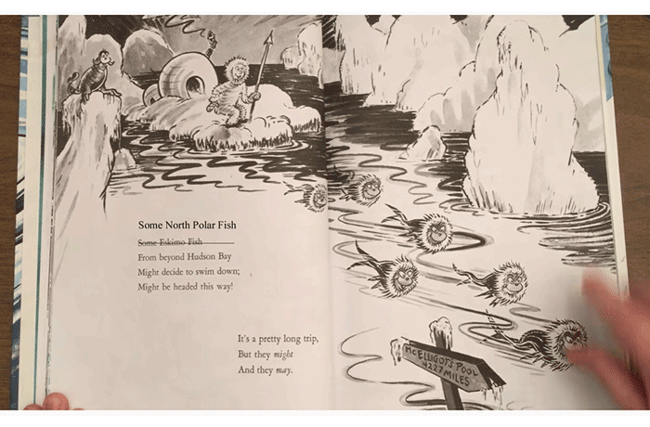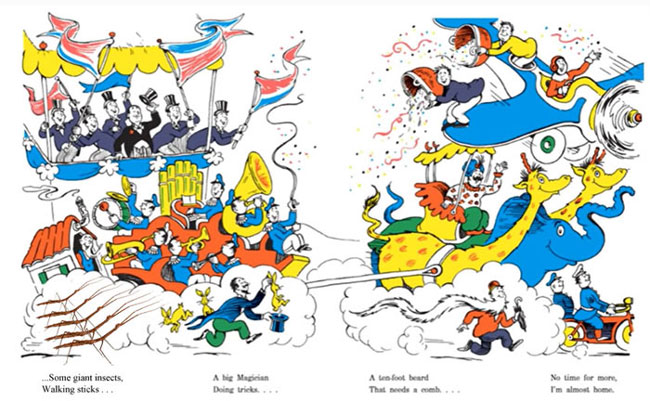

home Rolla Peace News March 16, 2021 |
Dear Friends:Editor's note: Please consider writing for our newsletter. It's always very exciting to be able to publish submissions from our readers.In this newsletter is: 1. NOON VIGIL FOR PEACE: THURSDAY, MARCH 18, 2021 2. FRIDAYS FOR FUTURE GLOBAL DAY OF ACTION AGAINST EMPTY PROMISES, FRIDAY, MARCH 19 3. THE MISFIT MATHEMATICIAN (Tom's column, http://tomsager.org) I Still Love Dr. Seuss 1. NOON VIGIL FOR PEACE: THURSDAY, MARCH 18, 2021 We vigil for peace in front of the Rolla Post Office, THIS THURSDAY, MARCH 18, FROM NOON TO 1:00 PM (and most subsequent Thursdays until Peace is established). Please join us this Thursday in saying NO WAR AGAINST IRAN or any other country. The temperature is predicted to be in the 40s. If you do not feel comfortable standing with us in front of the Post Office, please consider driving by and showing your support for our message by honking your horn and flashing a peace sign. Note 1: Since there are so few of us, generally 2 or 3, no need to cancel; but let's maintain social distancing. Note 2: In case of inclement weather, vigils may be canceled or terminated early. Note 3: On February 19 we began our 15th year of weekly vigils for Peace at the Rolla Post Office. 2. FRIDAYS FOR FUTURE GLOBAL DAY OF ACTION AGAINST EMPTY PROMISES, FRIDAY, MARCH 19 To my knowledge, nothing has been planned yet for Rolla. We welcome all climate activists to join us on Thursday, March 18 at Noon in front of the Post Office and demonstrate against empty promises. 3. THE MISFIT MATHEMATICIAN (Tom's column, http://tomsager.org) I Still Love Dr. Seuss Six books by Dr. Seuss, amazing books of childhood imagination, censored by the “keepers of truth and guardians of beauty” Why? Apparently, they didn't like an image of a young Chinese male eating with chopsticks; so they censored And to Think That I Saw It on Mulberry Street (1937). They didn't like the word “Eskimo” so they censored McElligot's Pool (1947). Both books are about a child's imagination running wild and astounding the “adults in the room.”“Imagination is more important than knowledge. For knowledge is limited to all we now know and understand, while imagination embraces the entire world, and all there ever will be to know and understand.” —Albert Einstein Such arrogance! First: these “keepers of truth and guardians of beauty” are telling young Marco: Imagination is fine, but we'll tell you what you are allowed to imagine. Don't imagine that you saw a “Chinese boy who eats with sticks;” Don't imagine that you might catch an “Eskimo Fish.” Such imaginings will not be permitted. Second, these “keepers of truth and guardians of beauty” are reaching far back into the past and telling authors long deceased what they are allowed and not allowed to write. In the case of McElligot's Pool (one of my favorites) those who are presently choking our oceans with plastics and literally killing the fish through global warming and acidification are telling young Marco, almost 75 years in the past, don't imagine that there are Eskimo Fish in the ocean. Such arrogance! But, as young Marco replies to the farmer who tells him he is a fool to try to catch fish in McElligot's Pool: Some might argue that a stereotypical image of a Chinese youth eating with chopsticks is hurtful. It certainly wasn't meant to be. In the 1930s China was a land of mystery. About all that many in the United States knew of Chinese people back then was that they have somewhat flatter faces than Caucasian people and eat with chopsticks.“Oh, the sea is so full of a number of fish, Some might argue that the word, Eskimo, is hurtful. It certainly wasn't meant to be hurtful. In fact, at the time, it was the only word many of us knew for peoples who lived above the Arctic Circle. It wasn't until much later in life that I learned names like Inuit, Aleut, Yupik and Sami. So, how are we to deal with changing perceptions of what might be hurtful? I've spent 19 years volunteering in schools reading to young children. If I think an image is inappropriate, I simply skip that page or, using a photo-manipulation program, change the page to something I feel more appropriate. If I think some words are inappropriate, I change them. (Actually, I rarely read stories. Instead, I tell the story, usually in my own words, particularly if I think some of the written words might be inappropriate.) Here's a page from McElligot's Pool with “Eskimo Fish” replaced by “North Polar Fish.” 

My favorite Dr. Seuss story is Bartholomew and the Oobleck. I think it's at least as important an environmental allegory as The Lorax and I think that having the hero of the story being the same age as my audience is very helpful in keeping their attention. For those not familiar with the story: I particularly like the ending. I think children deserve a happy ending. There is far to much unhappiness in the world already; and many children have already encountered far too much of it. I think Dr. Seuss might have agreed.King Derwin wants something new to fall from His sky. He calls his royal magicians and they make oobleck fall. Oobleck is green, gooey and sticky. There seems to be no way to stop the oobleck until the page boy, Bartholomew, gets the king to cry, “It's all my fault and I'm sorry. I'm awfully, awfully sorry!” Then the oobleck magically stops falling and melts away. Another facet of this story that I like is that it shows that children can change the world. After King Derwin and his magicians (scientists, as I tell the story) almost destroyed the world, Bartholomew sets everything right again by looking the king in the eye and telling him “You might be a mighty king. But you're sitting in oobleck up to your chin. And so is everyone else in your land. And if you won't even say you're sorry, you're no sort of a king at all.” (Perhaps, Greta Thunberg had this story in mind when she chastised our modern-day royalty: “People are suffering. People are dying. Entire ecosystems are collapsing. We are at the beginning of a mass extinction and all you can talk about is money and fairytales of eternal economic growth. How dare you!”) I think youth are learning that they can change the world. Perhaps, Dr. Seuss has helped to show them the way. Notes on the word, “Eskimo”: Note 1: There is an extensive discussion on Wikipedia of the word, Eskimo, which is viewed in Canada and elsewhere as a derogatory term. According to this article: Rolla Peace News is distributed by email once a week on Tuesday evenings (except on rare occasions) and is posted on the web at http://tomsager.org (click on Rollaites for Peace: near the top of rightmost column). If you don't wish to get notices of peace events in the Rolla area, let me know and I'll take you off this list. If you want to be added to this list, let me know. Wage peace, Tom yushasager (at) yahoo.com |